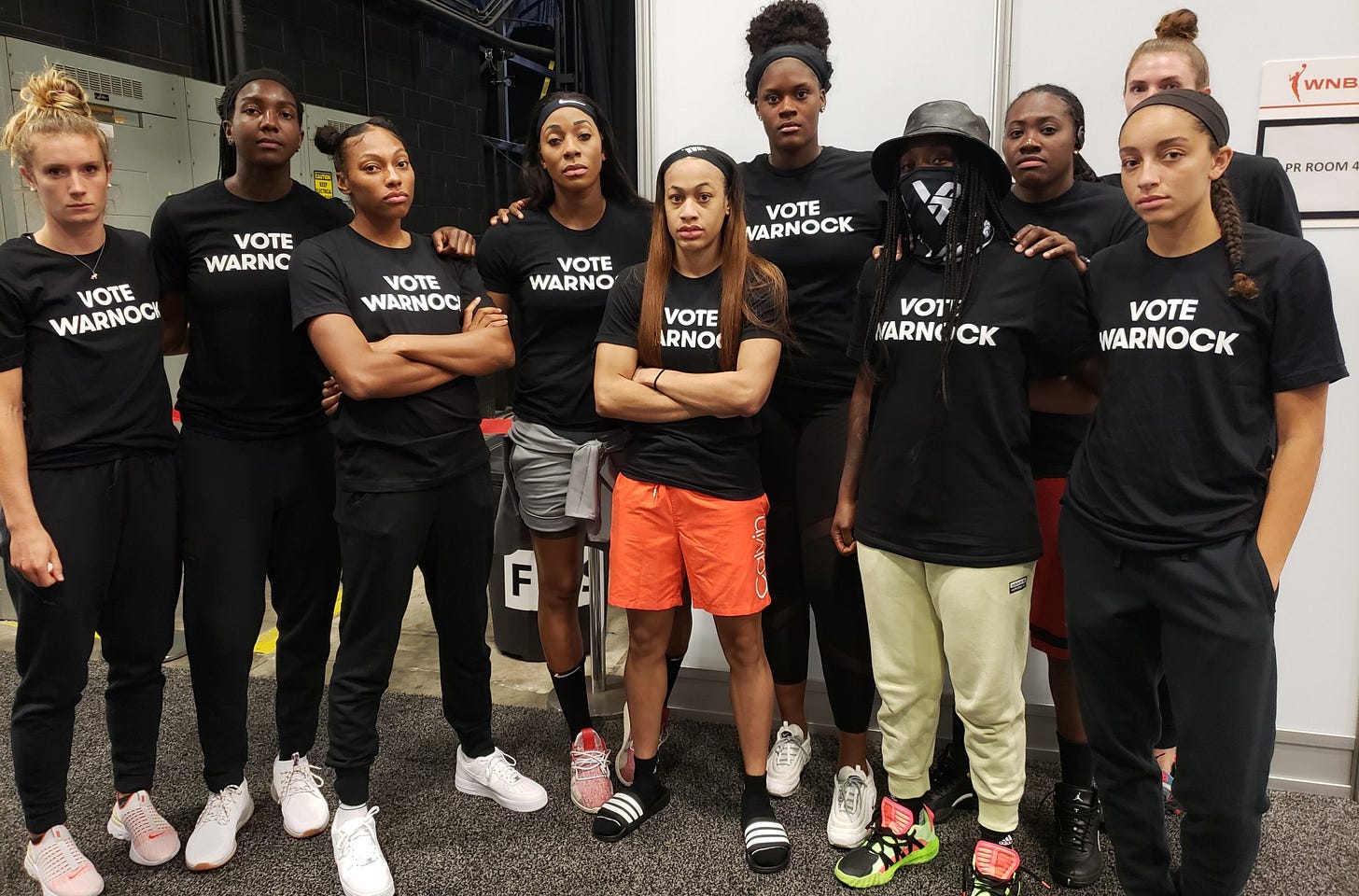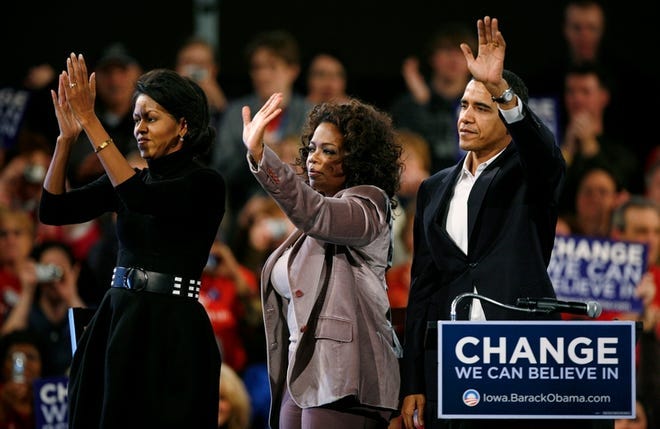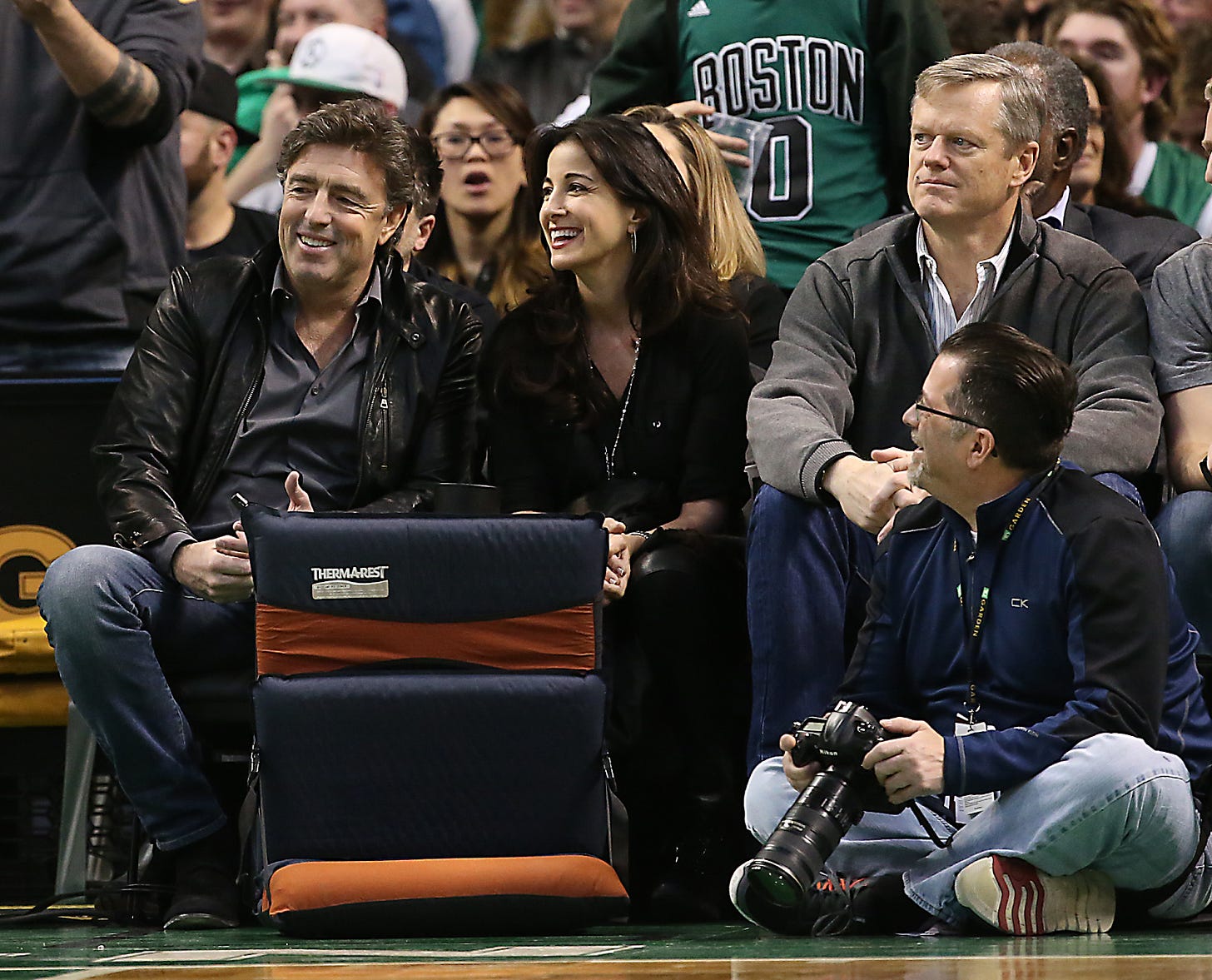Trump’s Right to Fear Celebrity Endorsements
Just not how they’re done today
Recently, President Trump took to Truth Social to go on a tirade against liberal celebrities like Bruce Springsteen and Beyoncé who supported Kamala Harris, calling for a “major investigation” into why only Kid Rock likes him into whether the Harris campaign paid for their endorsements. His focus on celebrity endorsements took me back to summer 2024.
Charlie XCX ruled that Kamala is indeed “brat.” Rumors circulated that Beyonce would bring her star power to the DNC stage. The lingering disappointment quickly dissipated when Taylor Swift endorsed Harris, signing off as a “Childless Cat Lady” to really get the people going. After a year defined by the Vibescession, unforgiving inflation, and the abysmal Biden debate performance, it finally felt like Democrats had hope again.
But all that celebrity brought was false hope. Contrary to what it feels like on a social media news feed, the political power of celebrity endorsements in presidential elections is largely gone. Celebrity influence can still be decisive in politics, but it needs to be local and issue-based.
Endorsements don’t move national elections
Today, celebrity endorsements in a presidential election are good for two things:
Campaign Engagement: Celebrity involvement can help campaigns engage with potential voters and volunteers. For example, in the week following Taylor Swift’s endorsement, the number of new registered voters in Pennsylvania almost doubled from the previous week. When celebrities participate in campaign rallies, they attract more people to these events where campaigns can collect voter information and recruit volunteers. Lastly, through direct appeals to their fans, leveraging their rich peers, or just by donating themselves, celebrities can help a campaign’s fundraising operation.
Permission Structure: The power of a celebrity endorsement can also multiply if it creates a permission structure for other celebrities. Taylor’s Instagram endorsement prompted Aubrey Plaza to post a similar endorsement. Multiple other celebrities directly referenced her endorsement in their own. Caitlin Clark and Kylie Kelce also liked Taylor’s post, creating headlines themselves and signaling their politics to their huge and varying fan bases without needing to make a formal endorsement themselves. This can create a snowball effect for campaign engagement.
Those two things are important. They can fire up the base and, largely through indirect ways, lead to more votes for a campaign. But notably, endorsements have shown little ability to persuade voters in a meaningful way.
Sticking with the Taylor Swift example, one survey of 1,000 Americans asked what influence her endorsement of a presidential candidate would have (before it actually happened). Swifties who were supporting Donald Trump said it would not change their minds if she endorsed a Democrat. Undecided Swifties said they were less likely to vote if she endorsed a Democrat.
My hypothesis for why even the most famous celebrities have little power anymore is two-fold. First, today, there’s a lot more negative polarization. People are dug into their tribes and, more importantly, they are dug into opposing the other side. It’s really hard to change that core part of someone’s identity.
Second, influence has been democraticized. In Sarah Frier’s book on Instagram, she noted that over 200 million Instagram users have more than 50,000 followers and more than 6 million users have more than a million followers. And that book was published five years ago! People get their content increasingly in microcultures where they find their own trusted voices, many of whom are not household celebrities. So as a collective, we no longer all follow and trust a handful of national voices. In fact, we’re quickly losing figures who are viewed as nonpartisan national leaders (Who even is there? The Rock?).
But endorsements can move primary elections
Celebrity endorsements can still move elections and lead to dramatic change, just in a less sexy way: primary elections. These have low voter turnout and little fanfare, factors that empower celebrities to move the needle if they have 1) a strong tie to the community and 2) credibility. Let’s look at two examples.
The Atlanta Dream & Senator Warnock
Think back to November 2020. We were at the height of the pandemic. For the first time in my adult lifetime, it was taking days to call the presidential election. Eventually, we found out Joe Biden won, but both Georgia Senate elections were headed for a run-off. At that point, Democrats had 48 seats in the Senate so those Georgia seats would decide which party controlled the Senate. The eventual election of Jon Ossoff and Raphael Warnock gave Democrats the slimmest of majorities and enabled President Biden to appoint judges and pass the American Rescue Plan and Inflation Reduction Act.
One of the biggest reasons Raphael Warnock beat Kelly Loeffler—by just 93,272 votes—is because of the endorsement of the WNBA’s Atlanta Dream.
In the summer of 2020, WNBA players decided to wear Black Lives Matter shirts to honor Breonna Taylor and other Black women killed by the police. In response, Kelly Loeffler, then a newly appointed Senator and co-owner of the Dream, wrote a letter to the WNBA Commissioner arguing that “we should be united in our goal to remove politics from sports.” In other words, shut up and dribble. Loeffler’s own team then decided to get involved in her race.
Photo from Vox.
The players held a call with Reverend Warnock to ask him questions and vet him for an endorsement. It’s important to remember that at the point, Warnock was facing an uphill climb in the primary election, registering less than 10% in polls. After a month of deliberations, the Dream endorsed Warnock, wearing “Vote Warnock” shirts to nationally televised games and posting about it on social media. Warnock rose in the polls, donations poured in, and he won his primary. A perfect foil to Loeffler, he ended up beating her by more than Jon Ossoff beat his opponent David Perdue in the other Georgia race.
The Dream had this monumental impact for a few reasons.
The team intervened in a primary election where their influence could go further by both raising awareness of the race and their candidate.
The team was part of the local community in this local election.
The team had built up credibility on the issues by dedicating themselves for months to social justice before getting involved with the election.
Oprah Winfrey & Barack Obama
Presidential elections are much harder to influence, even during primaries. But if an endorser has a unique community tie and credibility, it’s still possible. The prime example here is Oprah Winfrey’s endorsement of Barack Obama in the 2008 primary election.
Obama announced his candidacy for President in February 2007. Three months later, Oprah Winfrey endorsed him. An economic study found that Oprah’s endorsement was responsible for 1,015,559 votes going to Obama. He beat Hillary Clinton by only 41,622 votes.
Photo from the Associated Press.
Oprah’s influence was unique for several reasons. Despite having a national broadcast show since 1986, she had never endorsed a political candidate. She had been named to the Time 100 most influential people six times—more than anyone else ever at that time. According to Forbes she was the most powerful celebrity in 2007. She amassed a huge following both for her show and for her magazine, whose subscribers were disproportionately women with a college education between ages 25-64 (otherwise known as likely Clinton voters). At the time, 23% of Democrats said they would be more likely to vote for someone Oprah endorsed.
Shifting a presidential primary at the margin is a herculean task. But Oprah had built up a community for decades and had a global brand which gave her credibility when making her first endorsement. Her platform was also multi-faceted long before social media dominated; she had her talk show and a nationally distributed magazine. It’s hard to think of a parallel figure today who would had all of the factors that made Oprah’s endorsement so powerful.
Endorsements can also affect local policy
Imagine if Taylor Swift made a wholehearted appeal to Congress not to repeal the clean energy tax credits from the Inflation Reduction Act. It’d be silly. It wouldn’t activate her community and she has no credibility there.
But celebrities can use their platforms to raise awareness of and shift local policy decisions, an area, much like primary elections, where there is less popular attention (especially with the death spiral of local news).
For this Massachusetts-inspired publication, we’ll use the Boston Celtics as an example.
In 1961, Bill Russell and other Celtics players sat out a game to protest racial injustice. Almost 50 years later, the Milwaukee Bucks boycotted their playoff game in the NBA COVID Bubble in response to police shooting Jacob Black in Kenosha, Wisconsin. Jaylen Brown on the Celtics supported the Bucks’ decision:
“There’s a lot of guys that came down here for reasons other than basketball, and to use our platforms. Milwaukee did exactly that and, if necessary. it could be done again. Hopefully that won’t be the case but using our platform is why a lot of guys came down here.”
Jaylen Brown has long been a social justice advocate. A few months prior to the NBA Bubble, he drove 15 hours from Boston to Atlanta (his home city) to lead protests against racial injustice. He launched Boston XChange, an initiative to create a Black Wall Street in Boston and “attack wealth disparity” by providing entrepreneurs with up to $100,000 in grant funding and business support. His 7uice Foundation focuses on providing STEM education opportunities for Black and Brown students in partnership with MIT. All of that to say, he has strong ties to his Boston/Atlanta communities and has spent years building credibility on social justice issues.
That brings us to the policy advocacy that the Celtics players did. In 2020, they wrote an op-ed in the Boston Globe calling out Governor Charlie Baker for amending a section of a state bill that would regulate police use of facial recognition technology.
Despite our positions and profiles as professional athletes, we are not immune to racial profiling and discriminatory policing. Police violence and racism are unfortunately all too familiar for many players of color.
This bias against Black people and other people of color is baked into the criminal legal system, and it’s perpetuated at every level, including the tools that police departments use. That’s why we were disappointed to see that Governor Charlie Baker, in his amendments to the police reform legislation, removed the bill’s proposed regulations of government use of facial recognition technology. Baker’s rejection is deeply troubling because this technology supercharges racial profiling by police and has resulted in the wrongful arrests of innocent people.
This Beacon Hill-insider issue that had massive ramifications for the policing of Black communities in Massachusetts, and the Celtics players as a collective helped elevate that issue to the public (and certainly got the attention of Celtics fan Governor Charlie Baker). They also timed their advocacy for the two week stretch when the Governor and Beacon Hill were deliberating changes to the bill.
Photo of Charlie Baker sitting courtside from the Boston Globe.
Governor Baker had already staked his position, but the Celtics helped raise the importance of the issue. As part of the ultimate bill, the legislature established a commission on facial recognition technology that put out a report recommending several reforms. Those recommendations are now up for debate in the Massachusetts legislature.
Better-targeted endorsements can shift national politics through local politics
There are lessons here for both celebrities that are trying to become advocates and campaigns trying to win underdog races.
Until writing this post, I didn’t realize Lebron James had made a public endorsement for Kamala Harris (I only looked because I remember he did for Hillary Clinton). I’m going to go out on a limb to say that his endorsement did not change the election.
But I think LeBron has tremendous political power in America—more specifically, in Ohio. Lebron is the prodigal son of Ohio. Not only did he bring a championship to the his hometown Cavaliers, he’s also been an incredible community leader even after leaving the Cavs. He opened the public “I Promise” elementary and secondary school in Akron, and his foundation provides parents with G.E.D. preparation, health and legal services, and more. He’s helped open up housing units for families within a few blocks of the school and created a medical facility as well. He’s also pledged $41 million in scholarships to send 1,100 students to the University of Akron on a full ride.
With that level of community involvement and credibility, his voice would be powerful in Ohio politics. What could that look like?
In 2026, there will be a special Senate election in Ohio to replace JD Vance. Professional political prognosticators expect a Republican to win, as Ohio has continued to trend toward Republicans. LeBron could use his platform to influence which Democratic candidate ultimately wins the primary election and, potentially, the general election.
To start, he could ask every candidate in the Democratic primary for a meeting. It’d be malpractice for any of them to turn that down. In that meeting, he could ask them what their plans are for the communities he cares most about and the issues he prioritizes, like education. After, he could endorse one through an op-ed and a social media video, potentially skyrocketing them in the primary like the Atlanta Dream did with Warnock.
In the general election, LeBron could help an underdog Democrat compete. He could raise money, attend campaign events, convene other Ohio athletes, and use his platform to discuss why he thinks his chosen candidate would help his community. His community ties and credibility as a community advocate would give him far greater power of persuasion in Ohio than he would have in a national race. By making Ohio more competitive, he could help shift the balance of the Senate.
There are hundreds or thousands of celebrities who could have an impact like this by going and staying local. For Democrats, investing in getting celebrity endorsements for local races could make the party more competitive in Republican districts and states (something we desperately need to do to win the Senate).
That’s why President Trump shouldn’t worry about Bruce Springsteen’s speeches against him, he should worry about the Boss focusing on the NJ Governor’s race. He should get skittish if Duke and UNC legends dive into the North Carolina Senate election. He should feel nervous if Matthew McConaughey wants to put his stamp on the Texas race.
Liberals still have a lot of star power, the question is how they’ll use it.





Excellent post! I really appreciate your insightful breakdown of issues like this.